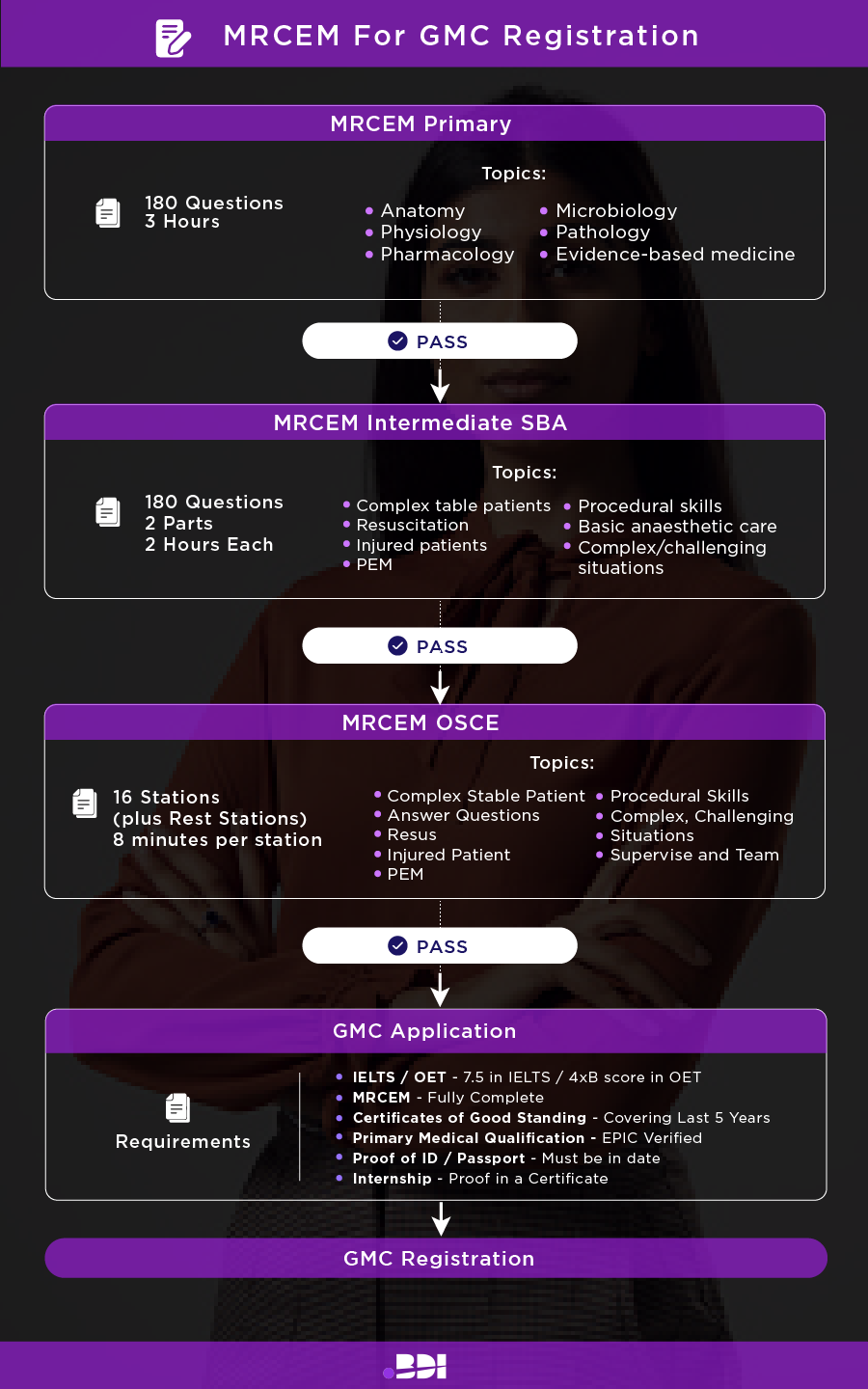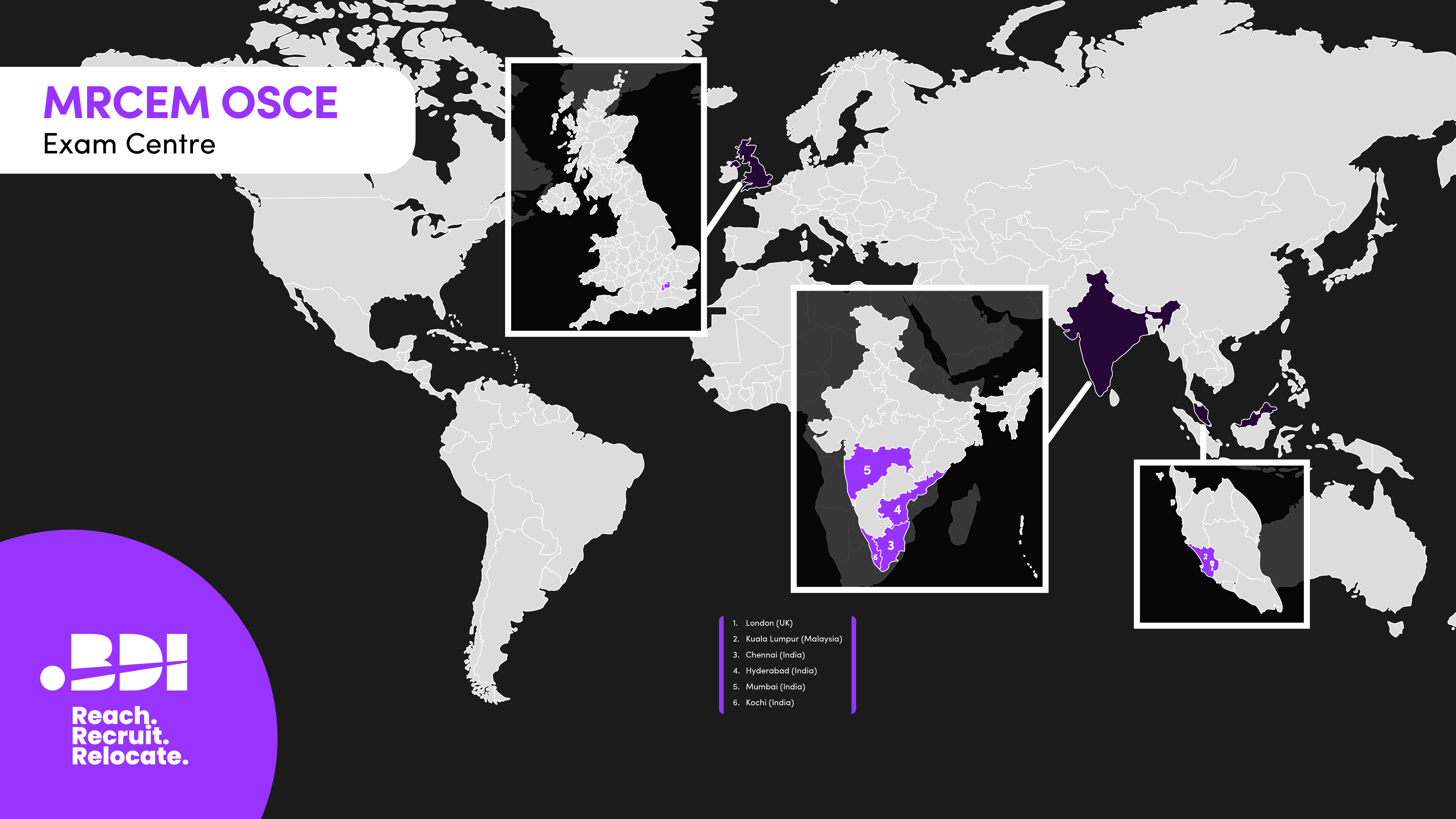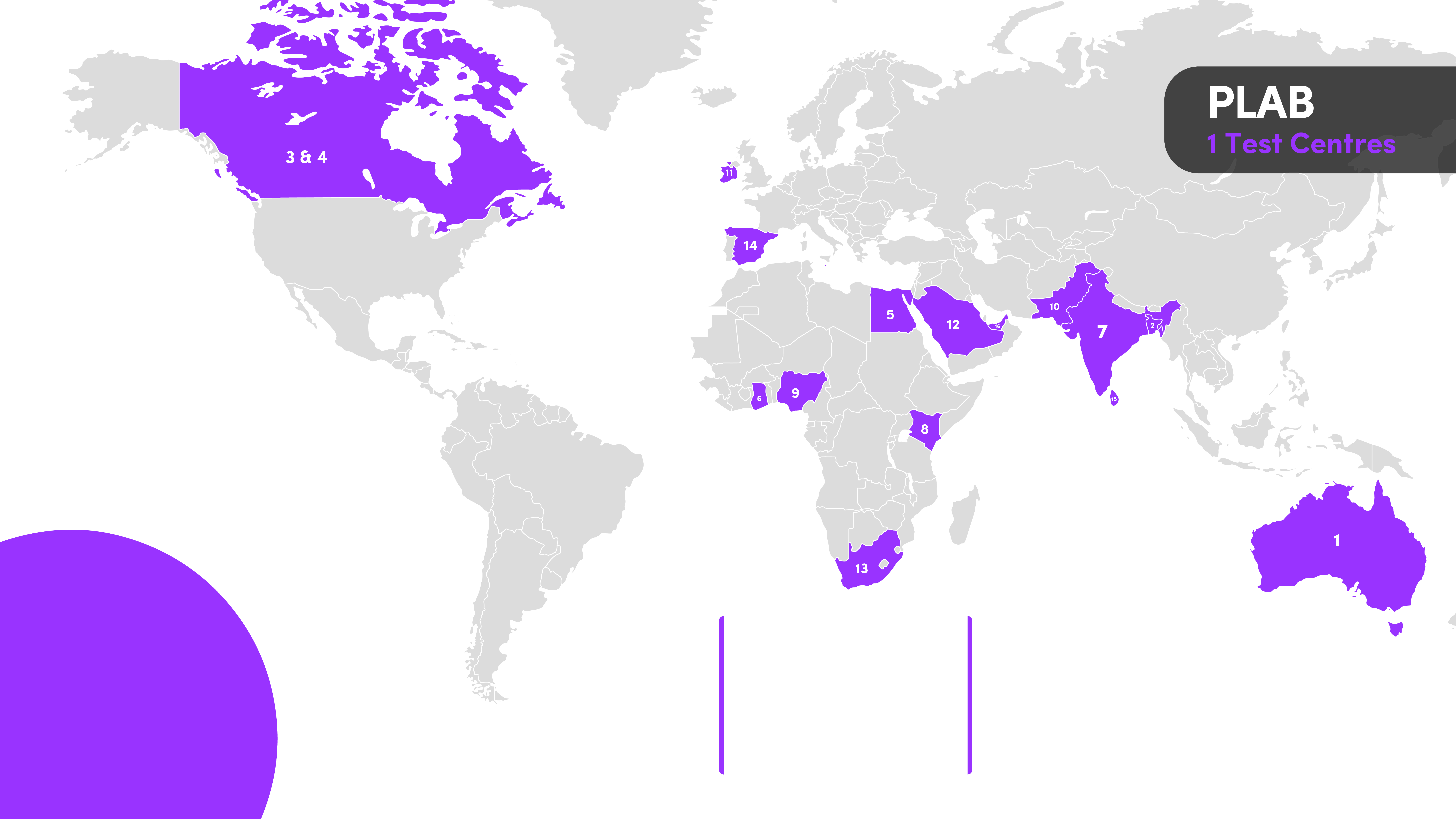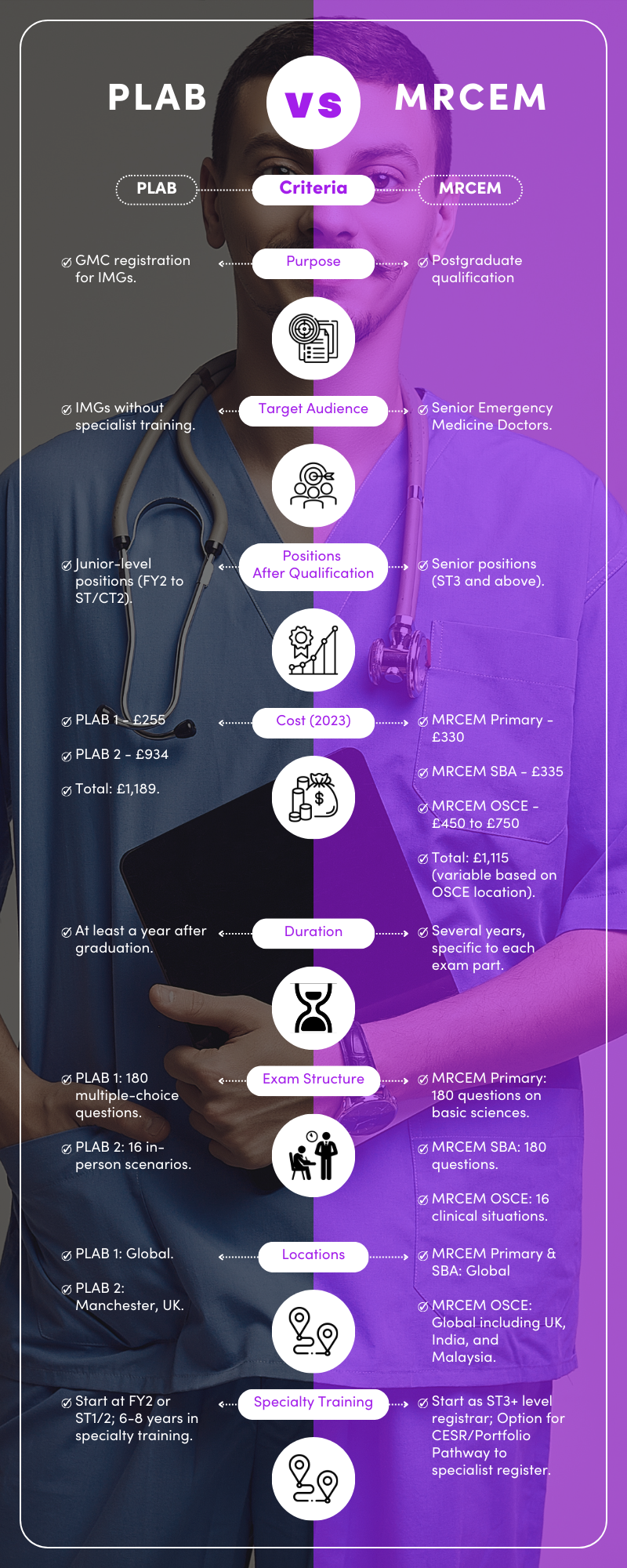MRCEM vs PLAB for GMC Registration in Emergency Medicine
20 Sept, 202314 Minutes
As an international doctor looking to relocate to the UK, the chances are you have heard of the PLAB tests before. These tests, which are set by the Professional Linguistic and Assessment Board, are specifically catered to IMGs to help them demonstrate their skills to become GMC registered. They are extremely popular with IMGs and are a fantastic route to the UK for many doctors.
If you have specialised in emergency medicine, you may have also heard of the MRCEM qualification – a postgraduate qualification offered by The Royal College of Emergency Medicine in the UK. This, too, can be used to get GMC registered, making PLAB obsolete if you acquire it.
Is PLAB or MRCEM Right for You?
So, which one is right for you, PLAB or MRCEM? Both are viable routes to GMC registration, allowing you to start practising as a doctor in the UK. That doesn’t mean they hold the same weight in other areas, though. To determine which one might offer you the best route into the UK for your career and aspirations, it’s a good idea to look at who these qualifications are for.
Who should sit PLAB?
PLAB is simply an entryway exam, allowing IMGs to become GMC registered. The exam is made specifically for that reason, as it tests the candidate’s knowledge, skills, and overall ability to practise medicine. As such, PLAB is for international medical graduates looking to get on the GMC register and start practising medicine in the UK – particularly those who do not yet have specialist training.
Who should sit MRCEM?
MRCEM stands for Membership of the Royal College of Emergency Medicine and is for doctors wanting to work in emergency medicine in the UK. Particularly, these doctors are those who want more senior roles within the NHS – to be able to demonstrate their high-level skills and abilities while earning a higher salary. Typically, these doctors have some form of emergency medicine training by the time they start the process of applying for MRCEM exams.
Are you still unsure about which one you should pursue to get GMC registered? Don’t worry – that’s understandable. You have many decisions to make, and this isn’t one you should rush, not when it’s the qualification that will catapult you into your NHS career! You need to be smart about it, so use this guide to learn more about PLAB vs. MRCEM so that you have all the information needed to make the best decision for your career goals.
What jobs will I get with PLAB Vs. MRCEM?
One of the best ways to figure out which route is best for you is by learning the types of jobs they each lead to.
PLAB typically leads to junior-level positions from FY2 (the second year of foundation training) up to ST/CT2 (often known as SHO level). While PLAB doesn’t prohibit you from pursuing senior roles, it won’t look as good on your CV as a Royal College qualification would. UK based trainees finish their MRCEM exams at ST3 level so if you hold those qualifications it’s a good marker for the person reading your CV that you’re ready for that level. That said, if you have PLAB and a number of years of experience in Emergency Medicine then you might still be considered for a registrar or speciality doctor post – it’s not impossible but might limit your options.
On the other hand, MRCEM is very likely to lead you to more senior positions in emergency medicine, and with it, you’ll be in a better position to apply for training posts at ST3 level and above. With MRCEM, you could also become a specialist, specialty doctor, or even locum Consultant whilst pursuing CESR / Portfolio Pathway to get on the specialist register. These emergency medicine posts are higher paying and hold more responsibility than the roles you’d typically get with PLAB. Your clinical experience will still play an important part in applications and MRCEM alone isn’t enough to secure the higher level posts.
This helpful guide to Royal College routes to GMC Registration also includes an excellent 'compare and contrast' between PLAB and Royal College routes:
PLAB Vs. MRCEM Costs
As an IMG, a driving factor behind your decision between PLAB and MRCEM may be the cost of the examinations. That’s understandable, considering relocating is already a costly affair, and if you can save money and end up in the same position, why wouldn’t you? So, let’s break down the cost.
How much does PLAB Cost?
PLAB comes in two parts: PLAB 1 and PLAB 2. You take both of these separately, and you also pay for them separately. As of April 2023, PLAB Part 1 costs £255 while PLAB Part 2 costs £934, totalling £1,189.
Be aware that the Professional Linguistic and Assessment Board often changes these prices yearly; if you book after 2023, you might find that they have risen! You can keep up to date with the GMC's latest fees here.
How much does MRCEM Cost?
The MRCEM exams come in three parts - here are the costs (as of 2023):
- MRCEM Primary: £330
- MRCEM SBA: £335
- MRCEM OSCE: £450 (or £650 for India and £750 for Malaysia)
In terms of overall price, PLAB will cost you £1,189 while MRCEM costs £1,115, making that one slightly cheaper (although it will cost more if you take the OSCE exam from India or Malaysia). It’s one of the rare cases where a Royal College exam is actually cheaper than PLAB!
PLAB Vs. MRCEM Completion Time
When it comes to how long it takes to complete PLAB vs. MRCEM, there’s a significant difference.
How long does PLAB take to complete?
As we have mentioned, PLAB comes in two parts: PLAB 1 and PLAB 2. You can take PLAB 1 as soon as you graduate from medical school and are then able to take the second part once you have passed the first. However, it’s recommended that you spend at least three months revising for each part of the examination (but preferably for longer). Plus, you’ll need at least a year’s worth of experience in training or an internship to get GMC registered. So, overall, you can expect PLAB to take about a year after graduation as a minimum, at which point you can get on the GMC register and begin your transition to the UK to work as an NHS doctor! In reality most doctors take a little longer and gain a couple of years experience internationally whilst working their way through the exams.
How long does MRCEM take to complete?
To understand how long MRCEM will take to complete, it’s a good idea to look at the eligibility criteria for each examination, including the recommended prep time:
MRCEM Primary
There’s no need for Emergency Medicine experience, but you will need to have graduated with your primary medical qualification. For this exam, we recommend between 3-6 months of revision to cover all the basic sciences.
MRCEM Intermediate SBA
The only requirement needed to sit MRCEM Intermediate SBA is having passed MRCEM Primary. However, The Royal College of Emergency Medicine does recommend at least some experience in emergency medicine, as this will greatly help you pass the exam. You should also put in a minimum of six months of preparation.
MRCEM OSCE
To take MRCEM, you must have passed both MRCEM Primary and MRCEM Intermediate SBA. On top of that, you need 24 months of post-graduation experience and six months of emergency medicine experience.
So, to complete MRCEM, you’ll need to have completed at least 24 months of training/experience after getting your primary medical graduation and completing your internship (of which at least six months must be in emergency medicine). That means it will take at least a couple of years longer to complete MRCEM than PLAB, and that’s assuming you do all the exams while completing your training experience. Consider that a UK trainee would complete MRCEM four years after graduating from medical school – that’s probably a reasonable minimum expectation for IMGs too.
So MRCEM will undeniably take longer than PLAB. To many IMGs, that extra time of preparation and training is worth it – while PLAB will get you into the NHS as a doctor faster, MRCEM leads to more senior positions as soon as you enter the UK, which many IMGs find more desirable.
MRCEM Exam Structure
To gain your Membership of the Royal College of Emergency Medicine, you must complete the three parts of MRCEM: MRCEM Primary, MRCEM Intermediate SBA, and MRCEM OSCE. Here’s a look at the structure of each examination:

MRCEM Primary Structure
MRCEM Primary focuses on basic sciences and includes 180 single best answer questions. You get a total of three hours to complete it, with topics including pharmacology, microbiology, and evidence based medicine.
MRCEM Intermediate SBA Structure
The second MRCEM exam comes in two parts and comprises 180 questions overall (with an hour’s break in between each paper). The questions here are a little more complex, focusing on topics like procedural skills and challenging clinical situations.
MRCEM OSCE Structure
Finally, the last MRCEM is an Objective Structured Clinical Examination. This practical exam mimics real-life clinical situations – sixteen in total. You have eight minutes at each station, with a minute between each to get to grips with the scenario. It’s quite intense and fast-paced, which is why a lot of experience is necessary to take this exam and pass.
Most IMGs find the MRCEM exams get more challenging as they delve into more complex topics. In particular, MRCEM OSCE requires a lot of clinical experience and knowledge, as well as high levels of communication.
PLAB Exam Structure
Whereas MRCEM has three parts, PLAB comes in two parts, and upon successful completion of both, you can use your pass to get GMC registered. In terms of exam content, the exams follow the PLAB test blueprint set out by the GMC, so use that for your studies.
PLAB 1 Structure
PLAB part one is a written examination. It has 180 multiple-choice questions with single best answers that you must choose from. These questions typically come with a clinical scenario and ask you to choose the answer that makes the most sense. You have three hours in total to complete this exam.
PLAB 2 Structure
PLAB 2 is a practical exam that you take in a test centre in Manchester, UK. There are sixteen scenarios you will encounter with two rest stations embedded. Each station lasts eight minutes and has two examiners there to test you. These stations/scenarios mimic real life clinical situations – perhaps on a ward or during a consultation – and you’ll have to act as you would as a physician in that situation while being assessed.
Both PLAB 1 and 2 run throughout every year – you can take PLAB 1 from multiple locations around the world, but PLAB 2 only runs in Manchester, England, so you’ll have to travel there for that.
This helpful video explains more about the PLAB option for GMC Registration:
MRCEM Exam Locations
MRCEM Primary and MRCEM SBA Test Centre Locations
The MRCEM Primary and SBA exams take place in the UK and at International Pearson Vue test centres around the world. You can see if there’s a test centre in your area by going to the Pearson Vue site here.
MRCEM OSCE Test Centre Locations

The MRCEM OSCE exam is hosted in several locations around the world, including:
- London (UK)
- Chennai
- Hyderabad
- Kochi (India)
- Kuala Lumpur (Malaysia)
- Mumbai
If you want to book an MRCEM exam, go to the RCEM exam dates and venues.
PLAB Exam Locations
PLAB Part 1 Test Centre Locations

UK Locations:
- Belfast
- Birmingham
- Cardiff
- Edinburgh
- London
- Manchester
- Newcastle
- Oxford
- Sheffield
Overseas Locations:
- Sydney, Australia
- Dhaka, Bangladesh
- Toronto, Canada
- Alexandria, Egypt
- Cairo, Egypt
- Accra, Ghana
- Bangalore, India
- Chennai, India
- Hyderabad, India
- Kolkata, India
- Mumbai, India
- New Delhi, India
- Nairobi, Kenya
- Abuja, Nigeria
- Enugu, Nigeria
- Lagos, Nigeria
- Islamabad, Pakistan
- Karachi, Pakistan
- Dublin, Republic of Ireland
- Riyadh, Saudi Arabia
- Johannesburg, South Africa
- Madrid, Spain
- Colombo, Sri Lanka
- Dubai, UAE
PLAB Part 2 Test Centre Locations
PLAB part two only takes place in one city in the world: Manchester, in the North of the UK. That means that, no matter where you live, you’ll have to travel to the test centre in Manchester to sit part 2 and complete PLAB.
Specialty Training: MRCEM Vs PLAB
For many IMGs, getting to the UK to work as a doctor is only the initial goal – after that, they want to make sure they secure a high-paying, senior position that gives them a high quality of life. That often means pursuing specialty training to become a specialist registered Consultant. So, how does that work when you take either PLAB or MRCEM for GMC registration?
Specialty Training with PLAB
Clearing PLAB grants access to GMC registration. From there, you’lll usually start in a service / non-training job at FY2 or possibly ST1/2 level. During this time you’ll complete your foundation or core competencies and apply to training from the beginning of the UK programme. As part of that training you will be expected to complete MRCEM along the way so you’ll end up doing these exams on your route to becoming a Consultant, either way.
Once you start specialty training, expect to spend six to eight years doing it. At the end of those years, you’ll have the opportunity to apply to be on the specialist register through CCT, allowing you to work as a Consultant in Emergency Medicine.
Specialty Training with MRCEM
Completing specialty training is a lot faster with MRCEM. After completing MRCEM, you can start applying for non-training positions as an ST3+ level registrar, specialty doctor, specialist, or even locum Consultant. Having completed MRCEM already, you’ll meet more of the criteria for speciality training so you could build an application to enter at ST3 training, working through the UK’s training system, eventually getting on the specialist register.
It is also possible to bypass the UK’s training system with MRCEM if you have the right level of experience from overseas. You can do this through CESR / Portfolio Pathway, which allows you to use MRCEM and evidence of your overseas experience to prove to the GMC that you are ready to get on the specialist register and practise emergency medicine as a Consultant in the UK. Check out our CESR guidance using the following articles:
CESR is becoming Portfolio Pathway
How to get CESR for Specialist Registration
How to get CESR CP for Specialist Registration
What are CCT and CESR for IMGs
MRCEM and PLAB: Access to GMC Registration
MRCEM and PLAB offer completely different routes into the UK. PLAB is a pathway to GMC registration, while MRCEM offers the same ability to get GMC registered while also giving your career a boost in emergency medicine. Which you choose entirely depends on your career aims – if you want to work in emergency medicine, you can bypass doing PLAB and pursue MRCEM to start UK work as a more senior doctor.
Of course, whichever route you take there are other things you’ll need for GMC registration, including:
- Proof of ID (Passport)
- A pass in IELTS or OET (unless you obtained your PMQ in an English speaking country)
- Certificate(s) of Good Standing
- Evidence of Fitness to Practise
- Proof of the last five years of activity
- PMQ
In Summary
Getting GMC registered is essential for any IMG wanting to practise medicine in the UK. How you do it is where things get a little more complicated. While many IMGs take PLAB to start at a junior-level position like FY2, many others prefer to use their experience to start at a more senior level. If you want to specialise in emergency medicine, MRCEM makes the most sense as a qualification to help you do just that. Here are the main key points to keep in mind:

Working for the NHS can be the next great step in your medical career, and MRCEM can help you specialise in emergency medicine in the UK. However, if you’re happy to start at the beginning (in terms of foundation training), then PLAB can also give you a good footing in the NHS, allowing you to get to grips with working there before specialising.
Whichever route you choose, BDI Resourcing are able to support your move to the UK. We help hundreds of Emergency Medicine doctors with the next steps in their career every year and only ever receive 5-star feedback. If you’d like our help in preparing your medical CV, revising ahead of your NHS interview or applying for NHS jobs, then please get in touch and our friendly team will be happy to support you.



